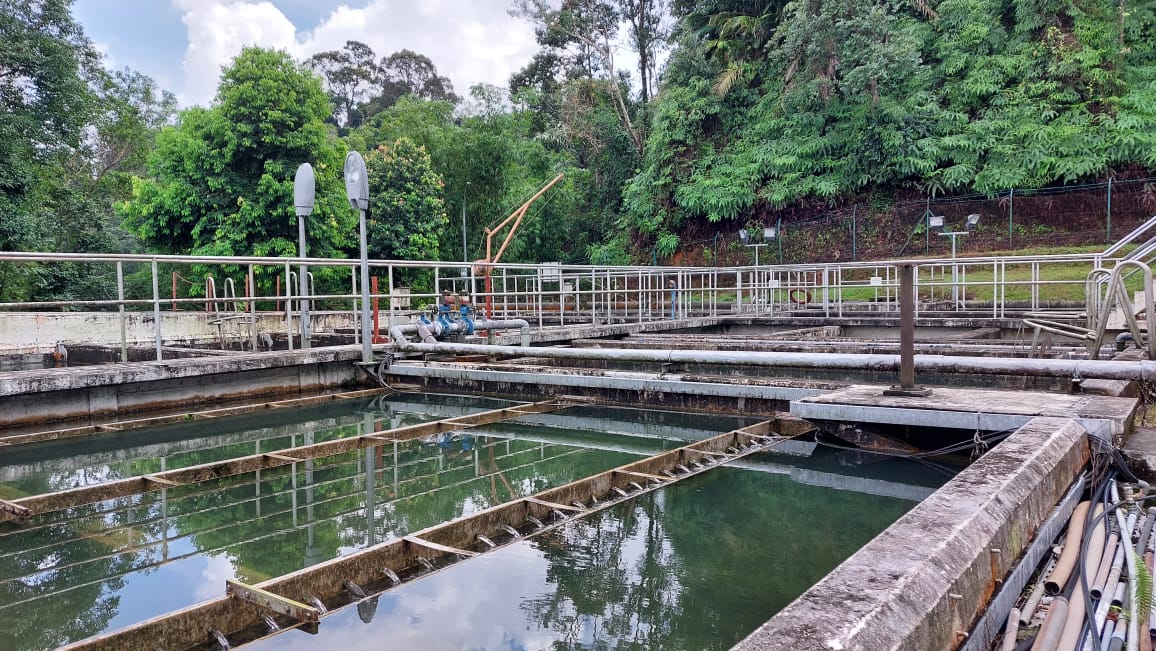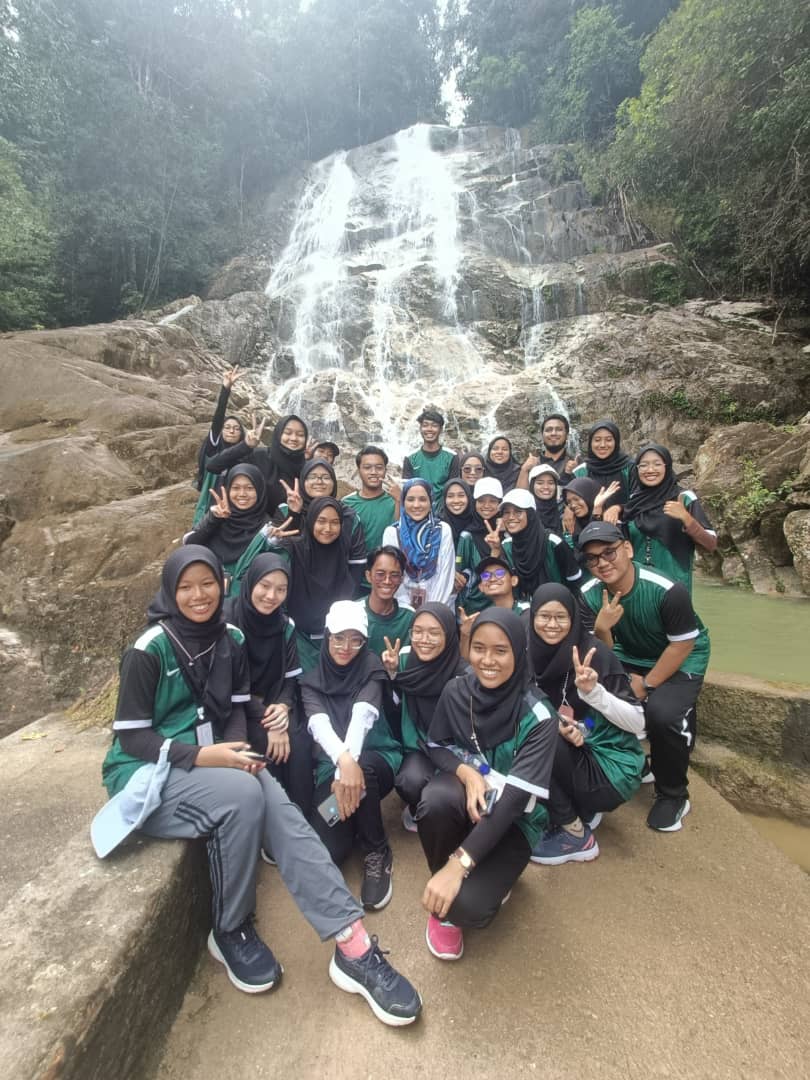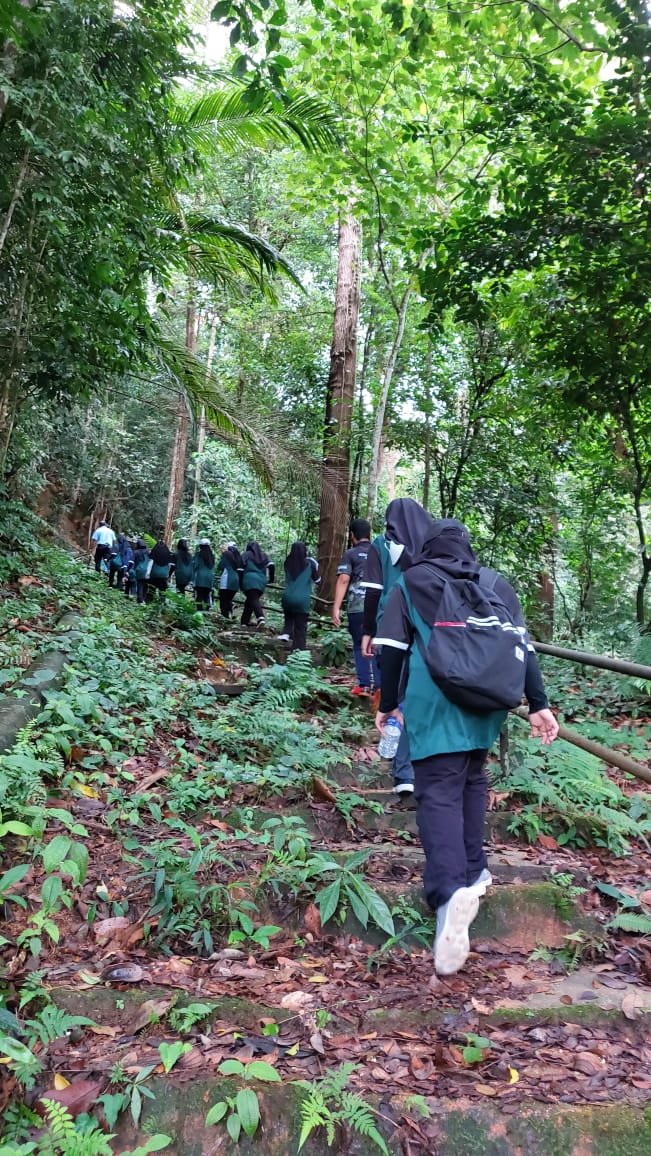
After almost 2 years of online classes and no physical activities, 14 June 2022, student part 2 of Diploma in Environmental Health, UiTM Cawangan Pulau Pinang, Kampus Bertam had a field trip to Conventional Water Treatment, Taiping and Gravity Fed System (GFS) Daerah Larut Matang and Selama. There are a total of 29 students who are involved in this field trip. This field trip was organized by Dr Tengku Nilam Baizura, lecturer of Water Supply course (ENV 188) and En. Khairi Aiman as a course advisor. The purpose of this field trip is to gain a better understanding on how the water treatment plant systems and the GFS (Gravity-Fed Water Supply) systems work in the Taiping residential area. The first place that we visited was Conventional Water Treatment Taiping Headworks that was located nearby the Hutan Lipur Bukit Larut.
During the field visit, students got the opportunity to have a close observation on how the raw water is being treated from the first water intake source until the end of the water treatment process which is the distribution of treated water to the consumers. Students also able to relate from what have been taught in class. All the process that was conducted for the water treatment process was explained with more detail by Encik Basir and Encik Jabir the officer uncharged at the water treatment plant. Their contributions in this field trip really helps the students to understand more about the water treatment process that was conducted in Taiping. Water treatment is a process that improves the water’s quality to make sure it is appropriate for human use. This process consists of 7 main stages which are screening, coagulation, flocculation, sedimentation, filtration, disinfection and distribution. Each process that was conducted requires monitoring from the staff to ensure that there are no problems occurring during the water treatment process.

Other than that, student also took this opportunity to learn as much as they can about the details of the GFS system since it is only applicable to a selected area. In the Larut Matang Selama river, the Bekalan Air Keselamatan Alam Sekitar (BAKAS) units took action to build six small water reservoirs along the Larut Matang Selama. The water reservoir was built to supply water to the villagers during emergencies such as lack of water. This GFS process that was conducted in this river uses a system named gravity feed system. The process carried out to the channel water is quite similar to the process at the Taiping water treatment plant. Small water reservoirs are built by placing nets and fences to undergo a screening process. The water is directly channeled to the storage tank. Then from the storage tank will be channeled directly to the houses of the villagers. The water does not undergo the treatment process because it is only used when they lack water and in an emergency. All these processes also use the gravity feed system process because the construction of the water tanks is located in a higher position than the villagers, so a pumping system is not required. The GFS system is a process that relies on gravity to help the water flow through the pipe system. For this field trip, the route before we arrived at the GFS system was quite challenging but it was interesting because we had an opportunity to see where the water intake checkpoints were located. For this system, En. Aman Zaa was the person in charge that explained more details about the GFS system. He provides a clear explanation for all processes that were involved in the GFS system. From our observations, the GFS system required a lot of consideration as it worked manually compared to the water treatment plant that uses high technology to supply treated water. As we know that water is the most important need in our daily lives. Having clean drinking water can prevent us from water borne disease and ensure that our health is in a good condition. Therefore, it is necessary for us to gain more knowledge about water treatment processes so that we can sustain good health and prevent contaminated water.

In the long run of the field trip at Conventional Water Treatment Plan, Taiping and GFS Daerah Larut Matang dan Selama that is located at Perak, we experienced to see and know the process to control or eliminate impurities present in water sources for domestic uses in surrounding areas in real life aside of just theory learnt. Furthermore, at Conventional WTP, we have the chance to catch a sight of two different water sources from Batu Teguh, and Sungai Ranting, as well as dose water, settled water and treated water which is in the process of chlorination. Also, the water is treated in both auto and manual processes conducted there. Along with, the uses of water supplied in residents’ daily use except for consumption as there is presence of E. Coli was mentioned by the worker. Next in GFS, the main focus is being highlighted on the treatment facilities that expose us to the treatment of raw water sourced from Larut Matang Selama river for villagers’ domestic uses during emergencies. Hence, by a knowledge gain from brief of the water treatment includes screening, coagulation, flocculation, sedimentation, filtration, disinfection, and distribution, now we tend get the point of the effectiveness and importance of water sampling in order to achieve the standard of water quality requirement for human consumption as well as residential’s daily uses, along with to make sure the well-being of living things.
